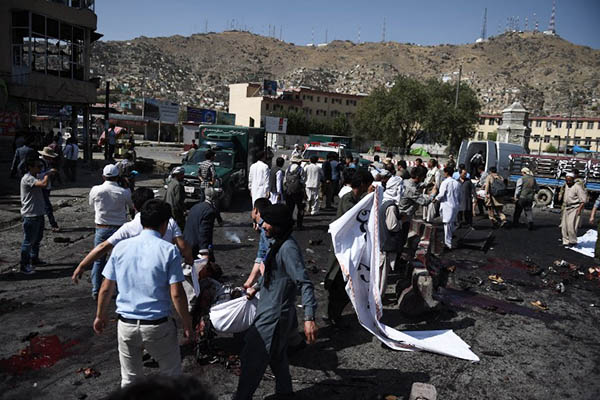
Wakil Kohsar—AFP
At least 80 dead, over 230 others injured in deadliest attack to hit Afghan capital since 2001.
Islamic State jihadists claimed responsibility for twin explosions on Saturday that ripped through crowds of Shia Hazaras in Kabul, killing at least 80 people and wounding 231 others in the deadliest attack in the Afghan capital since 2001.
The bombings during a huge protest over a power line mark the first major I.S. assault on Kabul, apparently aimed at sowing sectarian discord in the country.
Charred bodies and dismembered limbs littered the scene of the attack, with ambulances struggling to reach the site as authorities had overnight blocked key intersections with stacked shipping containers to control movement of the protesters. “As a result of the attack 80 people were martyred and 231 others were wounded,” the interior ministry said. “The attack was carried out by three suicide bombers… The third attacker was gunned down by security forces.”
The wounded overwhelmed city hospitals, officials said, with reports emerging of blood shortages and urgent appeals for donors circulating on social media.
The Taliban, who are in the middle of their annual summer offensive and are more powerful than I.S., strongly denied any involvement in the attack.
The Islamic State group claimed the bombings in a statement carried by its affiliated Amaq news agency, calling it an attack on Shias. “Two fighters of the Islamic State detonated their explosive belts in a gathering of Shias in… Kabul,” Amaq said.
The attack represents a major escalation for I.S., which so far has largely been confined to the eastern province of Nangarhar. The National Directorate of Security, Afghanistan’s main intelligence agency, said the attack was masterminded by Abu Ali, an I.S. commander in Nangarhar’s volatile Achin district.
“It’s long been a fear about Afghanistan that I.S.-aligned forces will try to inject a sectarian dimension into a largely non-sectarian conflict,” said Michael Kugelman, an analyst at the Woodrow Wilson Center in Washington.
The bombings, which the U.N. denounced as a “war crime,” mark the deadliest single attack in Kabul since the Taliban were toppled from power in a 2001 U.S.-led invasion, the interior ministry said. President Ashraf Ghani vowed “revenge” against the perpetrators of the attack and announced Sunday as a national day of mourning.
The assault came as thousands of demonstrators gathered to demand that a multimillion-dollar power line pass through their electricity-starved province of Bamiyan, one of the most deprived areas of Afghanistan with a large Hazara population. “This heinous attack was made all the more despicable by the fact that it targeted a peaceful demonstration,” the White House said in a statement.
Amnesty International said: “The horrific attack on a group of peaceful protestors in Kabul demonstrates the utter disregard that armed groups have for human life. Such attacks are a reminder that the conflict in Afghanistan is not winding down, as some believe, but escalating, with consequences for the human rights situation in the country that should alarm us all.”
The government has announced a ban on public protests for at least 10 days after Saturday’s demonstration, which was largely peaceful before the explosions tore through the crowds.
The 500-kilovolt TUTAP power line, which would connect the Central Asian nations of Turkmenistan, Uzbekistan and Tajikistan with electricity-hungry Afghanistan and Pakistan, was originally set to pass through the central province. But the government re-routed it through the mountainous Salang pass north of Kabul, saying the shorter route would speed up the project and save millions of dollars.
Hazara leaders in the ethnically divided nation lashed out at the Pashtun president, calling the decision prejudiced against their community, which has suffered a long history of oppression. The three million-strong Hazara community has been persecuted for decades, with thousands killed in the late 1990s by Al Qaeda and the mainly Pashtun Sunni Taliban.
